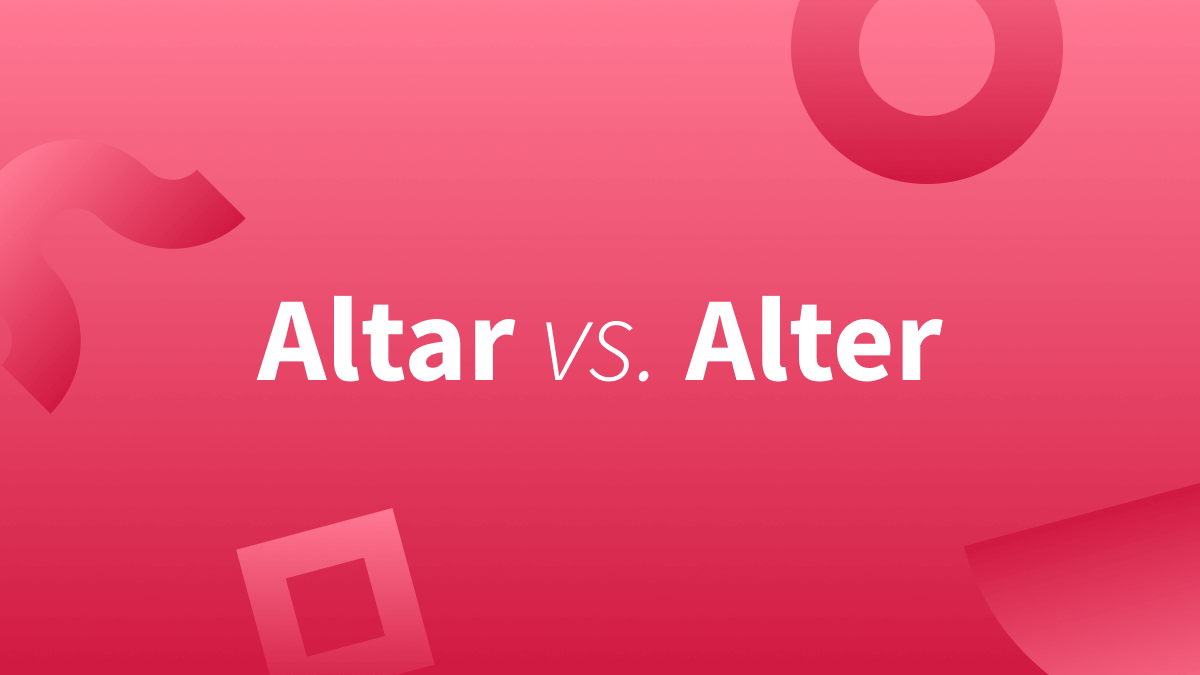Alter vs. Altar
- Alter is a verb that means “to change or modify.”
- Altar is a noun that refers to an elevated structure that is at the center of a religious ceremony or ritual.
- ○ He wanted to alter his truck to make it more elevated than normal.
- ○ For the sake of tradition, my family and I left roses at the altar at the church.
Misplaced Letters Can Alter Your Sentence
Which is correct?
- The wife-to-be wanted to alter the wedding altar at the last minute.
- The wife-to-be wanted to altar the wedding alter at the last minute.
Option A is correct.
One misplaced letter can render your sentence nonsensical. If you want to be a skilled writer, you should have comprehensive knowledge on tricky words like alter and altar. Yes, alter is a verb and altar is a noun. But there’s a bit more to it. Learn more about these words below.
“Alter” Definition and Examples
Alter is always used as a verb. It means “to modify oneself or something.”
Alter typically implies that the change was small but significant. To put it another way, the change generally causes no loss of original identity.
The book has been altered, as most are when they become movies.
The teacher is altering the assignment to suit the student’s needs.
She did not alter her behavior, even after the parent-teacher conference.
Alter ego is a noun that refers to someone’s “second identity.” It’s also sometimes used to refer to a close friend.
Super Man is Clark Kent’s alter ego.
Vicky is basically my alter ego.
The compound word mind-altering is an adjective that describes something (usually a drug) that “causes changes in mood or thought.”
As a psychiatry student, I studied all types of mind-altering substances.
“Altar” Definition and Examples
Altar is always used as a noun. It’s a table or any type of raised structure that is the center of religious worship, rituals, or ceremonies. For example, a wedding altar refers to the spot where the couple exchange vows and get married.
To get left at the altar means to be broken up with on the day of your wedding (yikes).
As a Christian, I received my communion at the church’s altar.
The wedding altar was decorated with hundreds and hundreds of daffodils.
My aunt was left at the altar, but proceeded with the party either way.
My friends and I built a makeshift altar when we were young where we promised to be best friends forever.

Altar is also sometimes used figuratively in the expression at/on the altar (of something). It’s used to give something great importance, and usually at the sacrifice of something else.
Skylar did not want to give up her work-life balance on the altar of a high-paying promotion.
It’s not uncommon for consumer trust to be destroyed at the altar of deceiving marketing tactics.
Using “Altar” and “Alter” Correctly
If you’re having trouble remembering the difference between alter and altar, just consider the spelling. Alter is always used as a verb (and both have “e’s”). Altar only ever functions as a noun.
If this mnemonic tip can’t help you, LanguageTool can. This multilingual spelling and grammar checker can correct various types of errors (including the misuse of alter and alter), suggest formatting improvements, and improve your style and tone by helping rephrase your sentences.

